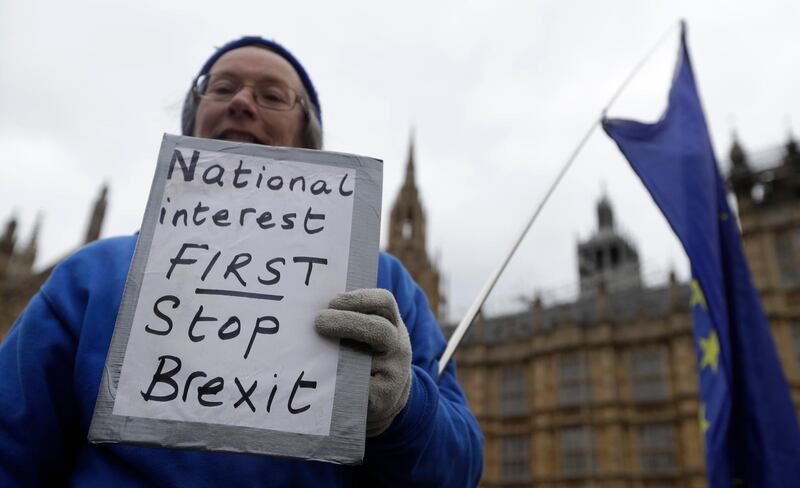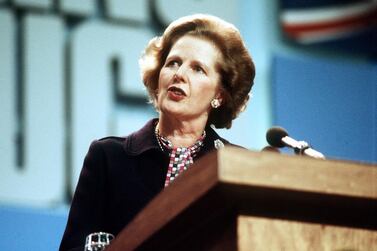Theresa May offered to step down as soon as the first phase of the Brexit process was complete with the passage of the withdrawal agreement before parliament.
Addressing Conservative MPs, Mrs May said that the she would not seek to lead Britain through the negotiations to establish a new relationship with Europe during the Brexit transition. The announcement marked a concession to backbench opposition to Mrs May's compromise with Brussels.
It came as the parliament wrested control over the Brexit process from the government and was debating a set of eight alternative proposals to break the impasse. Parliament voted to seize control of the parliamentary timetable from the front bench government on Wednesday.
The unprecedented move by MPs means they were to try collectively to find a majority option through a series of indicative votes. Mrs May earlier maintained her government is not obliged to listen to MPs because they are not legally binding.
Of the 16 amendments proposed the eight selected include leaving the EU without a deal on April 12, a second referendum, revoking Brexit, remaining in a customs union with the bloc, a closer alignment with the EU compared to the current withdrawal agreement proposed and a transition to a no-deal Brexit.
Mrs May’s European Union withdrawal agreement has already been overwhelmingly rejected twice this year by parliament. She conceded on Wednesday that her final act would be pushing the agreement into law.
"I have heard very clearly the mood of the parliamentary party. I know there is a desire for a new approach – and new leadership – in the second phase of the Brexit negotiations – and I won’t stand in the way of that," she told the evening meeting.
“I know some people are worried that if you vote for the Withdrawal Agreement, I will take that as a mandate to rush on into phase two without the debate we need to have. I won’t – I hear what you are saying.
“But we need to get the deal through and deliver Brexit.
London gained a last minute extension to leaving the EU last week but the delay infuriated many Brexiteers who wanted to leave as scheduled on March 29.
Britain will depart the EU on May 22 as long as the withdrawal plan on offer gains a majority in parliament by April 12. If not, it must advise the bloc on the way forward it plans to take.
The embattled Prime Minister is desperately trying to convince rebel members of her Conservative Party to back her Brexit plan. She is set to meet with hardline Eurosceptics late on Wednesday with reports suggesting many could support Mrs May’s deal as long as she resigns soon after.
Brexit figurehead Jacob Rees-Mogg appeared to say he could remarkably vote for the withdrawal plan on offer, fearful that Britain might never leave the EU otherwise.
Shortly before the indicative votes began on Wednesday evening, the SUP declared it would not support Mrs May's deal at another meaningful vote.
LATEST⬇️⬇️ pic.twitter.com/Y91C4aA09Q
— DUP (@duponline) March 27, 2019
Northern Ireland’s Democratic Unionist Party, who the government is in a confidence and supply agreement with, are likely to support an amendment supporting a ‘hard Brexit’. This would avoid the controversial Irish backstop, the insurance policy to ensure a friction-less border on the island of Ireland. The DUP fear they could be effectively locked in the EU indefinitely if there are not legally binding backstop changes.
Some Conservative Brexiteers have said they would reject Mrs May’s plan if the DUP did not back it. There have been reports the latter could support a lengthy Brexit delay, potentially as long as a year, so frustrated are they by the deal on offer.
Pushed by opposition leader Jeremy Corbyn in parliament on Wednesday, Mrs May did not offer backing of a Plan B. Mr Corbyn wants a deal that keeps Britain in the customs union.
Mr Corbyn slammed Mrs May's pledge to resign, accusing her of acting in the interests of her party, not the nation.
Theresa May’s pledge to Tory MPs to stand down if they vote for her deal shows once and for all that her chaotic Brexit negotiations have been about party management, not principles or the public interest.
— Jeremy Corbyn (@jeremycorbyn) March 27, 2019
A change of government can't be a Tory stitch-up, the people must decide.
Meanwhile EU chief Donald Tusk urged the European parliament to remember and “not betray” the more than six million people who signed a petition calling for a Brexit overturn, and the one million who marched through London in support of it.
"They may feel they are not sufficiently represented by the UK Parliament, but they must feel that they are represented by you in this chamber -- because they are Europeans,” he told MEPs.






